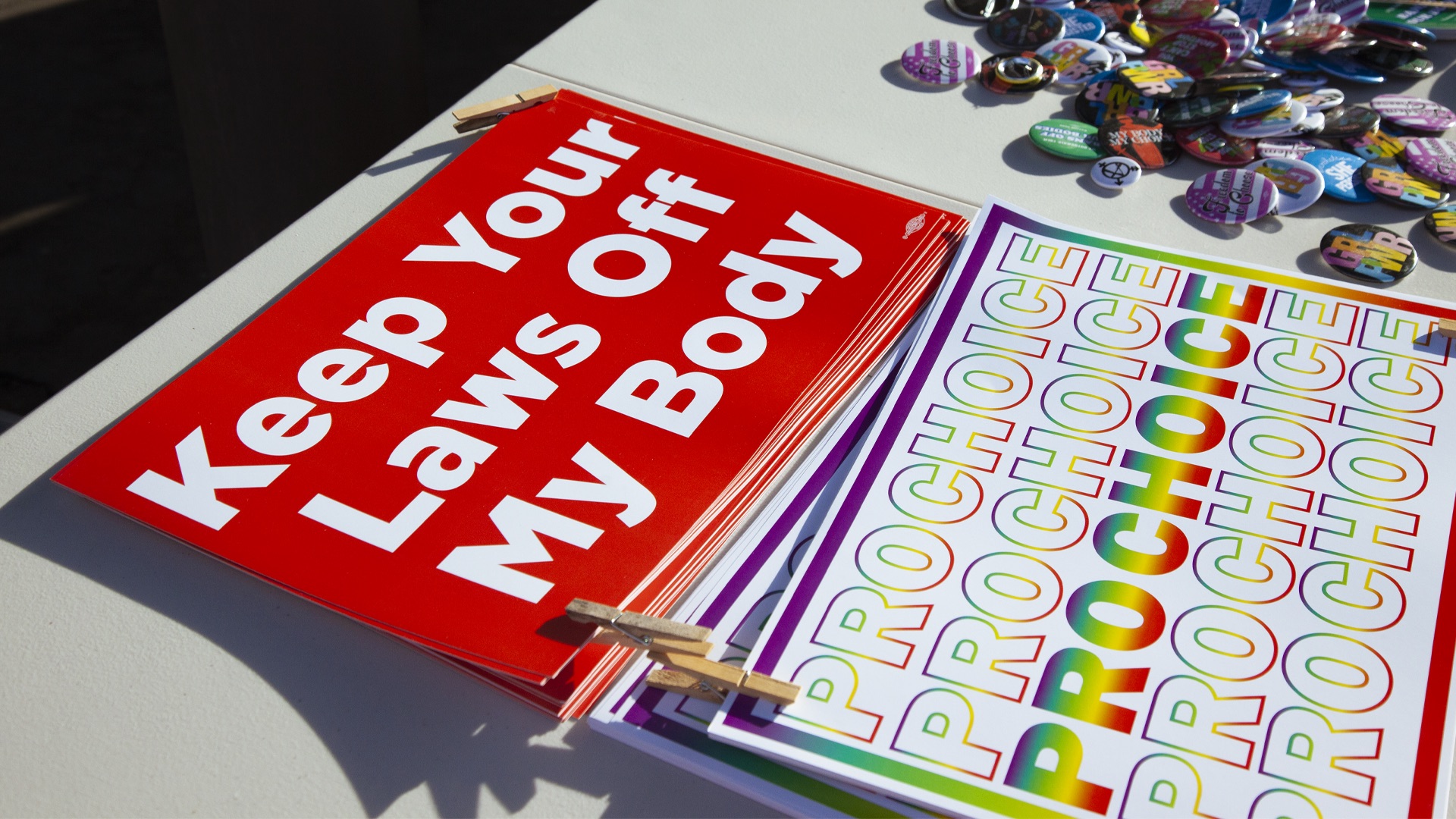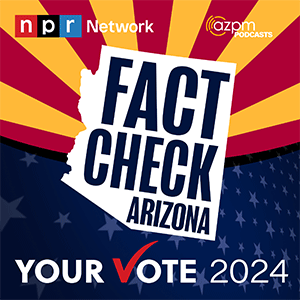
Fact Check AZ: Claims in Prop 139 campaigns

This week on Fact Check Arizona, we look at how campaigns on both sides of the abortion issue are attempting to persuade voters, and why those claims sometimes leave out key context.
More from Fact Check Arizona
Transcript:
Steve Jess: Welcome to the Fact Check Arizona podcast from AZPM. In each episode of this series, we'll look at a particular claim about elections in Arizona. We'll set the record straight and also give a sense of the context surrounding it. I'm Steve Jess.
This week we're focusing on breaking down Proposition 139 also known as the Right to Abortion Initiative. Joining me is our new student worker, Maggie Farmer, welcome Maggie.
Maggie Farmer: Hi Steve, thank you, I’m glad to be here.
SJ: To start off, you may have seen this advertisement funded by Arizona for Abortion Access floating around. Let's take a listen to the audio. The speakers are a couple identified as Ashley and Vance:
Ad: “Coming home from the hospital was incredibly sad and draining. I felt like I had lost so much. Doctors told us our baby wouldn't survive, then those doctors told us they weren't allowed to help me because of Arizona's abortion ban. watching my wife being forced to carry a baby that would not survive, the government had no right to do that to our family. I suffered because of Arizona's abortion ban we have to stop this ban we have to vote Yes on 139”
MF: These types of advertisements are - a tactic of theirs, they have a ‘stories’ portion on their website, along with sharing stories on YouTube and social media pages.
I had to do some additional digging into this as many of the Arizona for Abortion Access’s stories lack detail. Ashley gave more information in an Opinion piece she wrote for the Arizona Republic where we learn that her story took place in December of 2023, and she was over 15 weeks pregnant.
SJ: That is after the Dobbs decision, which allows states to restrict abortion. What was Arizona's Abortion policy looking like during that time?
MF: Arizona was in a complete state of confusion, as a “near-total” abortion ban, made back when Arizona was still a territory - the 1864 law, had had its injunction lifted and was now considered the law of the land. But, before the constitutional right to abortion was overturned, the Arizona state legislature passed a bill, which banned abortion after 15 weeks gestation. Once both laws were in effect, it left patients and providers wondering if abortion was banned outright - or legal up until 15 weeks gestation.
SJ: We have audio recordings of interviews conducted by AZPM's Paola Rodriguez with Dr Gabrielle Goodrick, an abortion provider at Camelback Planning in Phoenix, during this time of confusion.
Paola Rodriguez: “What has that conversation been like with having to tell patients that you can’t take in abortions due to the law, where have you been sending them?”
Dr. Goodrick: “We've been sending them to a website called https://www.ineedana.com/ or https://aidaccess.org/ I think or Plan C or sending them to websites that have referrals for clinics that are close. We don't work with any specific clinic at this point because I'm really hopeful that we will be able to provide people who can get pregnant with their choices that they need to make that are personal, private, and between a doctor and her patient and her family-”
MF: Dr. Goodrick also said:
“I didn’t go to medical school to go to prison or to do anything illegal, I'm just helping my patients”
SJ: So that's one provider's experience. Do we have any way of confirming her experience wasn't unique?
MF: Yes, Paola also spoke with a nurse at Camelback Planning named Ashleigh. She didn't want her full name included in the story.
Ashleigh: “During one of the shut downs, we had one of the doctors at the clinic whos registered to work in California, prescribe pills in California and had patients drive to the Arizona-California border to pick them up, and then they would do the first pill in California, and then come back to do the rest of the tablets. - It’s way more loopholes but I'm willing to help every single person who comes in this door find a loophole that works for them because it's ridiculous to not be able to access basic healthcare.”
SJ: That was back in 2022, are these stories still relevant in 2024?
MF: Well not necessarily. Currently, Arizonans can obtain, and providers cannot be prosecuted for, providing abortion care in accordance with Title 36. Governor Katie Hobbs repealed the near-total abortion ban, meaning the state’s 1864 abortion ban will not become enforceable again in Arizona and the 15-week restriction remains, including a medical emergency exemption.
SJ: So how would Prop 139 change that?
MF: It amends the state constitution to provide the fundamental right to abortion, and says that the state of Arizona may not restrict before the point of fetal viability.
-But there are questionable constitutional changes according to the leading opposing campaign - called, It Goes Too Far. Let’s take a listen to an interview on the program Arizona Horizon. You'll hear Ted Simons with Cindy Dahlgren - the communications director for It Goes Too Far:
Ted Simons: “The idea that this restores the rights from Roe. I will hear some proponents say that's all it does. Do you disagree with that?”
Cindy Dahlgren: “Absolutely. It goes far beyond Roe. And this is why, under Roe v Wade, states could enact limitations. They could enact safety precautions. They can ensure that only qualified medical doctors see women, they can ensure that parents have the right to know if their minor daughter is involved or is getting an abortion. And under prop 139, you can have none of that. So it goes far beyond Roe.”
MF: Arizona For Abortion Access says "Prop. 139 is based on the very-Arizona idea that people have a right to individual autonomy, including in our healthcare decisions- without unnecessary government interference." The argument from It Goes Too Far is that certain –what it calls– 'government interferences' are necessary for a woman's safety.
Safety regulations like ultrasounds, notices, parental consent and even the 'physician-only' requirement would not be enforceable given the proposed language in Article 2 Section 8.1- which lacks the term doctor or physician.
It does say ‘health care professional’, and the Legal Information Institute at Cornell University says that term, when used in legal settings, means the person is licensed, certified, or registered to provide health care services.
SJ: Maggie, thanks for joining us for your first appearance on the news side here at AZPM.
MF: Of course Steve, thank you!
SJ: That's our look at Proposition 139. If you have any comments, get in touch with us. Our website, is news.azpm.org. The election is now days away, so this is the last episode we have planned for the season. But we'll be back if there are any claims about how the election itself was conducted that need a fact check. Don't forget to subscribe wherever you get your podcasts.
Zac Ziegler is our producer. For Maggie Farmer, I'm Steve Jess. Thanks for listening.


By submitting your comments, you hereby give AZPM the right to post your comments and potentially use them in any other form of media operated by this institution.